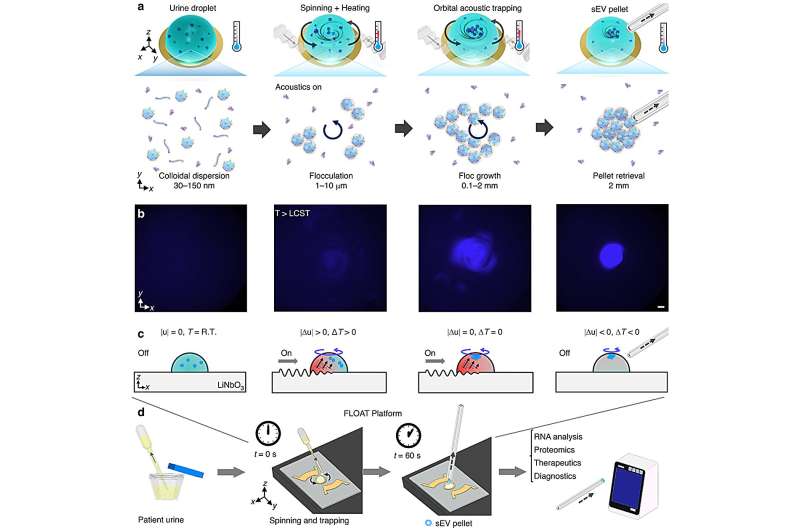
Extracellular vesicles (EVs) have emerged as promising biomarkers for non-invasive disease diagnostics, offering an alternative to conventional biopsies. However, the challenge has been the efficient and pure isolation of EVs from biological fluids, as current methods yield variable results. Recognizing this gap, researchers have focused on developing advanced techniques that can isolate EVs with high efficiency and purity, crucial for the accurate detection and monitoring of diseases.
A recent study published in the journal Microsystems & Nanoengineering, researchers introduced Flocculation via Orbital Acoustic Trapping (FLOAT), a novel method that markedly enhances the extraction of EVs from biological fluids. This innovative technique represents a significant leap forward in enabling non-invasive diagnostics for a variety of diseases, opening up new pathways for medical research, and enhancing patient care options.
Traditional methods of EV isolation have struggled with low efficiency, high sample volume requirements, and contamination issues, limiting their practical application in clinical settings. FLOAT addresses these challenges head-on by integrating acoustofluidic technology with a novel flocculation process.
At the core of FLOAT is the use of thermoresponsive polymers that induce flocculation of EVs when exposed to specific temperature conditions within a rotating liquid droplet. This process not only significantly enhances the purity of the isolated EVs but also dramatically reduces the volume of biological fluid needed, making the method both more efficient and less invasive.
The acoustofluidic component of FLOAT involves generating an orbital path for the rotating droplets, leveraging acoustic forces to concentrate the flocculated EVs at specific locations within the droplet. This ingenious combination of flocculation and acoustic trapping allows for the rapid and high-yield isolation of EVs, a stark improvement over existing technologies.
Professor Tony Huang, a senior author on the study, stated, “The FLOAT method represents a significant leap forward, offering over 90% recovery rates and reducing sample volume requirements by a factor of 100. This innovation could transform the landscape of disease diagnosis and monitoring.”
The implications of this research are profound. By providing a reliable, efficient, and scalable method for EV isolation, FLOAT opens the door to the widespread adoption of liquid biopsies for early disease detection. It promises to revolutionize how diseases are diagnosed and monitored, offering hope for earlier intervention and personalized treatment plans.
More information:
Joseph Rufo et al, High-yield and rapid isolation of extracellular vesicles by flocculation via orbital acoustic trapping: FLOAT, Microsystems & Nanoengineering (2024). DOI: 10.1038/s41378-023-00648-3
Provided by
Aerospace Information Research Institute, Chinese Academy of Sciences
Citation:
Novel tech captures disease markers in a snap: The future of early diagnosis (2024, April 8)
retrieved 9 April 2024
from https://phys.org/news/2024-04-tech-captures-disease-markers-snap.html
This document is subject to copyright. Apart from any fair dealing for the purpose of private study or research, no
part may be reproduced without the written permission. The content is provided for information purposes only.







